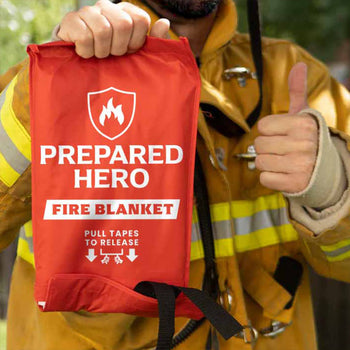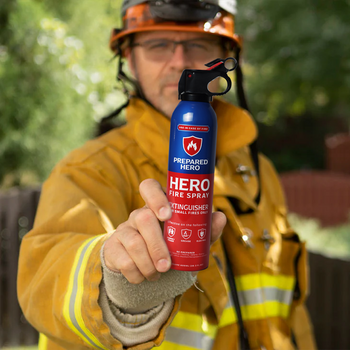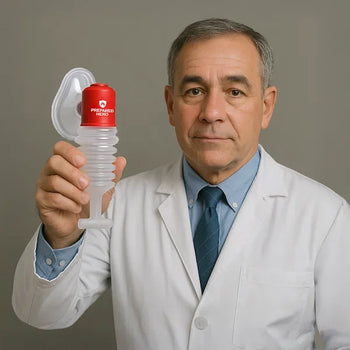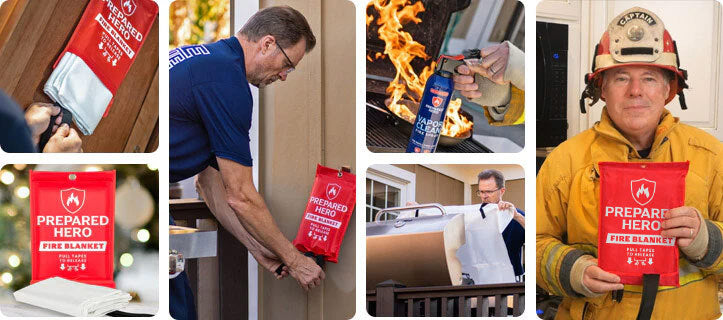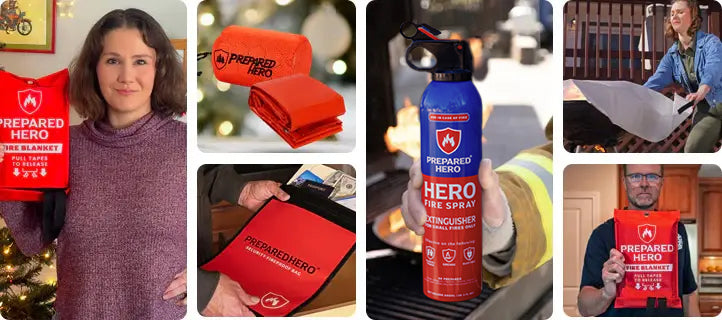Where you put your smoke detectors matters just as much as installing them. Proper placement makes sure they can detect...
Space heaters can be a simple way to warm up a chilly room, but they also come with some risks if you’re not careful. Whether you’re using one during the day or overnight, there are a few key things to keep in mind. From where you place it to how long you run it, small choices make a big difference. Here’s what you need to know to use a space heater safely and avoid common hazards.
How Space Heaters Work

Space heaters warm up a room by turning electricity into heat. It does this through the heating element made of ceramic, metal, or quartz. When electricity flows through it, the element heats up.
Some heaters use a fan to push warm air around (convection), while others use infrared rays to heat objects and people directly (radiation). Many modern space heaters come with safety features like automatically shutting off when they get too hot or tip over.
Whether you're heating a small space or just need a little extra comfort, space heaters do the job quickly and safely, as long as you use them properly.
Space Heater Safety Features to Look For

Space heaters are handy when you need warmth, but not all of them are equal. Some are made better than others. Here are the features to look for before buying one:
1. Safety Certifications
Always check if the space heater has a safety label from a trusted testing organization, such as UL (Underwriters Laboratories), ETL (Electrical Testing Laboratories), or CSA (Compliance, Safety, and Accountability). This means the space heater passed safety checks.
If it doesn’t have one, skip it. Some heaters without proper certification have been recalled due to overheating and starting fires. A label might seem small, but it’s a big deal.
2. Automatic Shutoff
Make sure the heater has a tip-over switch and overheat protection. It should be able to shut off by itself if it gets knocked over or starts to overheat. These features help prevent fires and give you peace of mind, especially if you forget to turn it off before leaving the room.
3. Shock Protection
If you plan to use your heater in a place like a laundry area or near the kitchen, check for a plug with shock protection. Look for one with an ALCI (Appliance Leakage Current Interrupter) or GFCI (Ground Fault Circuit Interrupter) plug. They’re bulkier plugs that trip the circuit if there’s an electrical imbalance or moisture. They also reduce the chance of a shock.
4. Bathroom-Safe Marks
The bathroom is a risky place for heaters. Never use a space heater in the bathroom unless it’s specifically made for that. If you want a heater in your bathroom, look for bathroom-safe markings and certification from a testing lab. If it’s not designed for wet spaces, don’t risk it.
5. Durable Power Cord
Avoid space heaters with cheap, thin cords. A sturdy six-foot cord is standard, but make sure it’s not damaged. Never plug heaters into extension cords or hide the cord under rugs or furniture because it can lead to overheating.
15 Space Heater Safety Tips to Stay Warm and Safe

Space heaters are useful during cold weather, but they pose fire risks when used the wrong way. Here are some tips to avoid fires and stay safe:
1. Keep it at least three feet away from anything flammable.
Always give your space heater breathing room from anything that can catch fire, like curtains, beds, couches, and rugs. The United States Fire Administration recommends keeping your space heater at least three feet away from such things. This distance helps prevent items from heating up and igniting. It's a simple habit that goes a long way in keeping your home safe.
2. Only plug it into a wall outlet.
Plug your space heater directly into a wall outlet. Don’t use extension cords or power strips. They can overheat quickly and spark fires because they're not built for high-powered devices. You should also avoid plugging in anything else to the same outlet to prevent overloading the circuit or causing a fire hazard.
3. Never leave it unattended.
It’s not safe to leave a space heater running unattended, especially when you’re asleep or out of the room. If something tips it over or it malfunctions, you won’t be around to stop it. Always turn it off before leaving to avoid fire risks and unnecessary energy use.
4. Put it on a flat, solid surface.
Set the heater on a flat, steady surface like tile or hardwood flooring. Avoid placing it on carpet, rugs, or furniture. They can block airflow or cause the unit to tip. A solid surface helps it stay upright and reduces the chance of overheating or falling over, especially in busy areas.
5. Keep kids and pets away.
Space heaters can get hot to the touch and are easy to knock over. That’s a risky combo if you have curious kids or pets in the house. Place your space heater somewhere out of reach or watch your kids and pets when they’re around it. Remember, a quick accident could turn into a serious injury or fire.
6. Check for a safety label.
Look for a label from recognized safety organizations like UL, ETL, or CSA. This means the heater has been tested for fires and electrical safety. Buying a cheap, untested heater might save money up front, but it's not worth the risk. Stick to certified units that meet proper safety standards.
7. Read the manual.
Your space heater might be easy to use, but you should still read the manual. It tells you how to set it up, where to place it, and what to avoid. You’ll also learn about any special features or warnings specific to your model. A few minutes of reading can help prevent big problems.
8. Regularly check your heater.
Look for any frayed wires, cracked plugs, or loose parts. These signs of wear could cause electrical shorts or Class C fires. If something looks off, don’t use it. It’s better to replace a broken unit than risk your safety.
9. Don’t use it for anything else.
A space heater designed to warm the air. Don’t try to dry clothes, warm bedding, cook food, or thaw frozen items with it. Doing this can block airflow, trap heat, or cause nearby items to catch fire. Stick to its actual purpose and avoid any heating hacks.
10. Avoid water.
Electric heaters and water don’t mix. Never place a space heater near a sink, bathtub, or in any damp area like a bathroom or laundry room. Even a bit of moisture can damage the unit or cause a shock. If you need heat in those spaces, look for certified bathroom heaters.
11. Don’t use unvented kerosene heaters.
Unvented kerosene heaters release harmful gases like carbon monoxide, which can build up indoors and cause serious health problems. Skip it unless it’s vented properly and approved for indoor use. Safer options like electric or oil heaters are better for indoor spaces and won’t mess with your air quality.
12. Install smoke alarms.
Make sure you have working smoke detectors on every floor and outside every bedroom. Test them monthly and replace the batteries at least once a year. You might follow all safety tips, but things can still go wrong. A working smoke alarm gives you an early warning if something catches fire.
13. Place it out of the way.
Don’t put your space heater in high-traffic areas, hallways, or near doorways. Someone might trip over it, bump into it, or knock it over. This can cause burns or start a structure fire. Place it somewhere with good airflow, out of walkways, and where it won’t be accidentally disturbed.
14. Unplug when not in use.
Unplug your heater once you’re done using it. Leaving it plugged in when not in use still poses a fire risk, especially if the cord gets damaged or overheats. Plus, it saves electricity.
15. Have a fire safety kit.
Keep a fire blanket, fire spray, and a flame shield nearby just in case. Accidents can happen when you least expect them. A fire safety kit lets you act fast and stop a small fire from spreading.
Do you want reliable, easy-to-use, and affordable tools to put out small fires before they spread? Check out Prepared Hero’s fire prevention tools here, and get up to 51% off on certain items.
How Safe Are Indoor Space Heaters?

Indoor space heaters are safe, but only if you use them the right way. Electric ones are safer than gas or kerosene heaters because they don’t mess with your indoor air quality. However, they’re not risk-free. They can start a fire if you put them too close to curtains, beds, or furniture. They can also cause burns if touched, especially by kids or pets.
Heaters with built-in safety features like tip-over protection and overheat shut-off are a better choice. If you’re going for convection heaters, oil-filled models are a safer option since the heat is more stable. Just don’t leave them unattended, and make sure they’re on a flat, stable surface.
Is It Safe to Leave a Space Heater on All Night?
It is not safe to leave space heaters on all night. Fires, lack of oxygen, and carbon monoxide poisoning (for fuel-burning types) can occur if something goes amiss when you’re asleep. For this reason, it’s not safe to leave one on when you’re sleeping or going away.
Even electric heaters can overheat, tip over, or ignite nearby items. It’s safer to warm the room before sleep, then turn the heater off when you’re ready to rest. If you absolutely need overnight heat, look for models with built-in timers, automatic shutoff, and tip-over protection. But even then, it’s safer not to leave them on while you’re sleeping.
What Is the Biggest Threat of a Space Heater?

The biggest threat of a space heater is fire. According to the NFPA (National Fire Protection Association), space heaters account for about 33% of heating equipment fires. They also cause the highest number of deaths and injuries in home fires caused by heating equipment.
If a heater tips over or is placed near flammable items, things can go wrong fast. Kids, pets, and even adults are at risk of getting hurt. Some parts get so hot they can ignite clothes or nearby furniture. While space heaters can be helpful, one small mistake, like bad placement or the wrong outlet, can turn dangerous quickly.
Where Is the Safest Place to Put a Space Heater?
The safest place to put a space heater is on a flat, solid, non-flammable surface like tile or hardwood. Never put it on rugs, beds, or furniture. Keep it at least three feet away from anything that can catch fire, and don’t place it near water or in bathrooms, where moisture can cause shocks or fires. You should also make sure it’s in a low-traffic spot so no one trips over it, especially kids or pets.
How Likely Is a Space Heater to Start a Fire?

Space heaters are one of the leading causes of house fires when misused. According to the CPSC (Consumer Product Safety Commission), around 1,700 fires each year are linked to portable space heaters. Despite the safety mechanism, accidents will happen if the heater has been set too close to flammable objects or has been left unattended.
Do Space Heaters Turn Off if They Get Too Hot?
Many modern space heaters turn off if they get too hot. This safety feature prevents fires and saves the unit from getting damaged. While this safety feature helps, common sense won’t take its place. Use the heater properly and set it at a safe distance from anything flammable.
What Is a Safer Alternative to a Space Heater?

Safer alternatives to space heaters include oil-filled radiators and ceramic heaters. They stay warm longer and are less likely to overheat. Some even shut off on their own if something goes wrong. You can also layer up, use thicker blankets, or improve insulation to stay warm without using appliances.
Conclusion
Space heaters keep you cozy, but your and your loved ones’ safety always comes first. Whether you use one for a few hours or to just take the chill off, knowing how to set it up and run it safely makes all the difference. Stick to the basics, follow the safety tips, and you'll stay warm without the worry. Stay safe, hero!


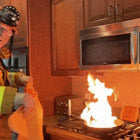 Fire
Fire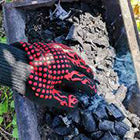 Safety
Safety Survival
Survival Protection
Protection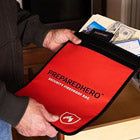 New
New
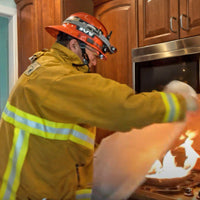 Fire
Fire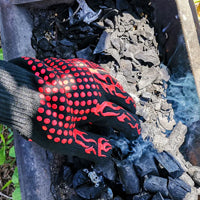 Safety
Safety Survival
Survival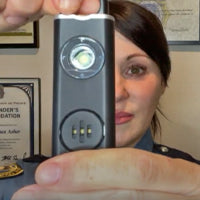 Protection
Protection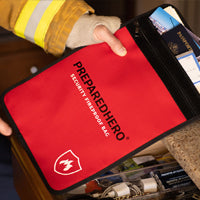 New
New
